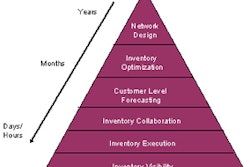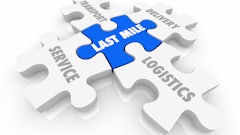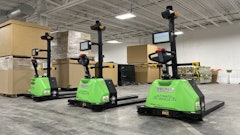
Fidelitone Logistics Executive Vice President Mike Schoenfeld
By Mike Schoenfeld
With the current economic situation, it is no surprise that companies are looking for ways to help cut costs and condense staffing. Many are turning to third-party logistics (3PL) providers to help them develop an outsourcing strategy. As experienced solution providers, 3PLs are successful in helping companies fight through financial burdens and survive the recession. While there are those who think 3PLs are adjusting their services because of the recession, the reality is these services are essentially more appealing than ever before.
Benefits of an Outsourcing Strategy
During tough economic times, the availability of capital comes at a premium cost; companies in a myriad of industries struggle to maintain their investment in infrastructure and continuous improvement. Long-term strategies are often postponed or abandoned in favor of short-term or temporary cost avoidance. An outsourcing strategy can help mitigate these effects. 3PLs have a sizeable advantage over a "go-it-alone strategy" because their capital investments are typically leveraged across their entire client base. No single company needs to build the entire infrastructure necessary to execute their supply chain.
For example, a major U.S. manufacturer of power tools uses a 3PL to execute its service parts supply chain. Services performed on behalf of the manufacturer include sourcing, forecasting and procurement of inventory, global and domestic freight management, warehousing and distribution. In this case, the manufacturer was able to tap into an existing infrastructure of information systems, trained personnel, forecasting tools and facilities. There were no upfront capital costs to secure a solution.
Implementation of Technology
Major continuous improvement strategies typically involve some sort of technology investment. 3PLs can offer technology strategies quickly and inexpensively. More than likely, the more sophisticated 3PLs are experienced in leading large system implementations. Their implementation of systems that control order, inventory and logistics flows are done in a precise and cost-effective manner because most often they are simpler. By their very nature, 3PL companies are designed to focus on simplifying processes and eliminating non-value added effort. They also have the luxury of being separated from the bureaucracy and business requirements of the larger organizations of their customers. Not to mention their ability to offer a unique perspective as they execute what they implement.
The ideal scenario occurs when a company can simply ride on the back of an already implemented system. Many of today's supply chain software companies have specifically targeted the 3PL marketplace. They are developing enterprise resource planning (ERP) and other supply chain execution systems with data structures that support multi-client implementations. Thus, when a 3PL adds a new client, there is simply a setup process rather than a new implementation. This greatly reduces the risk and implementation costs. The best 3PLs in the industry have capitalized on these capabilities by adding software-as-a-service to their business offerings. Thus their clients can purchase capabilities such as order, inventory or transportation management as an entire service, offering both the software and execution expertise.
The consumer electronics and appliance retail business offers excellent examples of a 3PL providing software-as-a-service. Major retailers in this market have purchased end-to-end supply chain execution of service parts for their in-home repair service offerings from a 3PL. These services include the buying, forecasting, order management and the entire trading partner order-to-cash process. However, unlike the traditional model where the service provided by the 3PL is physical handling of goods, this process happens virtually.
The 3PL purchases and executes its ERP application on behalf of its clients. All the physical handling of parts happens back at the supplier level. The manufacturers ship their warranty and service parts directly to the retailer's customer. The value here is that the software application running as the backbone was sold as a service. There was no need for the retailer to invest in systems or training of personnel to run those systems. The secondary value, which is by no means small, is that by enabling the manufacturer to ship direct to the end consumer, an entire node of the supply chain was eliminated. The 3PL did not have to physically handle the products.
Variable Structure
When 3PLs have their own infrastructure (warehouses, equipment and software), costs for their clients can be moved from a fixed structure to a variable structure. 3PLs provide the flexibility and capability that allow their costs to be entirely or mostly transactional. In tough times, the transactional nature of the fees is far more advantageous because as sales volumes drop, there are fewer transactions and thus fewer transaction fees. In other words, their clients pay for what they use and do not have to carry the burden of the infrastructure costs without the sales volume to support it.
In the wake of a recession or economic downturn, it is common for individual saving to increase and consumer spending to decrease. As a result, demand for products and services declines and increased inventories and prices ensue. This is where it pays to have flexible supply chain management. In such instances, companies do not want to be caught in fixed distribution and warehousing costs.
Do What You Do Best
Finally, an outsourcing strategy enables companies to focus on the core competencies they wish to retain in house. During uncertain economic times, companies need to concentrate on what will enable them to compete in tough market conditions. Executives should be spending their time on new product and service offerings, marketing strategies and competitive concerns. They should not have to worry about their products reaching their customers or whether they should invest in new distribution centers or inventory systems. A good 3PL partner can remove this burden completely.
In a recession, many companies choose outsourcing for its economic advantages — primarily lower operating costs and the freeing up of capital. However, outsourcing also enables them to focus on what truly drives their success. Timeliness is key. Taking advantage of the capabilities a 3PL offers not only helps companies in difficult times, but enables them to concentrate on company growth and innovation.
About the Author: Mike Schoenfeld is executive vice president at Fidelitone Logistics. Prior to Fidelitone, Schoenfeld served as vice president of solution design and vice president of customer development with Exel, and he previously spent 11 years with RedPrairie. More information at www.fidelitone.com.
With the current economic situation, it is no surprise that companies are looking for ways to help cut costs and condense staffing. Many are turning to third-party logistics (3PL) providers to help them develop an outsourcing strategy. As experienced solution providers, 3PLs are successful in helping companies fight through financial burdens and survive the recession. While there are those who think 3PLs are adjusting their services because of the recession, the reality is these services are essentially more appealing than ever before.
Benefits of an Outsourcing Strategy
During tough economic times, the availability of capital comes at a premium cost; companies in a myriad of industries struggle to maintain their investment in infrastructure and continuous improvement. Long-term strategies are often postponed or abandoned in favor of short-term or temporary cost avoidance. An outsourcing strategy can help mitigate these effects. 3PLs have a sizeable advantage over a "go-it-alone strategy" because their capital investments are typically leveraged across their entire client base. No single company needs to build the entire infrastructure necessary to execute their supply chain.
For example, a major U.S. manufacturer of power tools uses a 3PL to execute its service parts supply chain. Services performed on behalf of the manufacturer include sourcing, forecasting and procurement of inventory, global and domestic freight management, warehousing and distribution. In this case, the manufacturer was able to tap into an existing infrastructure of information systems, trained personnel, forecasting tools and facilities. There were no upfront capital costs to secure a solution.
Implementation of Technology
Major continuous improvement strategies typically involve some sort of technology investment. 3PLs can offer technology strategies quickly and inexpensively. More than likely, the more sophisticated 3PLs are experienced in leading large system implementations. Their implementation of systems that control order, inventory and logistics flows are done in a precise and cost-effective manner because most often they are simpler. By their very nature, 3PL companies are designed to focus on simplifying processes and eliminating non-value added effort. They also have the luxury of being separated from the bureaucracy and business requirements of the larger organizations of their customers. Not to mention their ability to offer a unique perspective as they execute what they implement.
The ideal scenario occurs when a company can simply ride on the back of an already implemented system. Many of today's supply chain software companies have specifically targeted the 3PL marketplace. They are developing enterprise resource planning (ERP) and other supply chain execution systems with data structures that support multi-client implementations. Thus, when a 3PL adds a new client, there is simply a setup process rather than a new implementation. This greatly reduces the risk and implementation costs. The best 3PLs in the industry have capitalized on these capabilities by adding software-as-a-service to their business offerings. Thus their clients can purchase capabilities such as order, inventory or transportation management as an entire service, offering both the software and execution expertise.
The consumer electronics and appliance retail business offers excellent examples of a 3PL providing software-as-a-service. Major retailers in this market have purchased end-to-end supply chain execution of service parts for their in-home repair service offerings from a 3PL. These services include the buying, forecasting, order management and the entire trading partner order-to-cash process. However, unlike the traditional model where the service provided by the 3PL is physical handling of goods, this process happens virtually.
The 3PL purchases and executes its ERP application on behalf of its clients. All the physical handling of parts happens back at the supplier level. The manufacturers ship their warranty and service parts directly to the retailer's customer. The value here is that the software application running as the backbone was sold as a service. There was no need for the retailer to invest in systems or training of personnel to run those systems. The secondary value, which is by no means small, is that by enabling the manufacturer to ship direct to the end consumer, an entire node of the supply chain was eliminated. The 3PL did not have to physically handle the products.
Variable Structure
When 3PLs have their own infrastructure (warehouses, equipment and software), costs for their clients can be moved from a fixed structure to a variable structure. 3PLs provide the flexibility and capability that allow their costs to be entirely or mostly transactional. In tough times, the transactional nature of the fees is far more advantageous because as sales volumes drop, there are fewer transactions and thus fewer transaction fees. In other words, their clients pay for what they use and do not have to carry the burden of the infrastructure costs without the sales volume to support it.
In the wake of a recession or economic downturn, it is common for individual saving to increase and consumer spending to decrease. As a result, demand for products and services declines and increased inventories and prices ensue. This is where it pays to have flexible supply chain management. In such instances, companies do not want to be caught in fixed distribution and warehousing costs.
Do What You Do Best
Finally, an outsourcing strategy enables companies to focus on the core competencies they wish to retain in house. During uncertain economic times, companies need to concentrate on what will enable them to compete in tough market conditions. Executives should be spending their time on new product and service offerings, marketing strategies and competitive concerns. They should not have to worry about their products reaching their customers or whether they should invest in new distribution centers or inventory systems. A good 3PL partner can remove this burden completely.
In a recession, many companies choose outsourcing for its economic advantages — primarily lower operating costs and the freeing up of capital. However, outsourcing also enables them to focus on what truly drives their success. Timeliness is key. Taking advantage of the capabilities a 3PL offers not only helps companies in difficult times, but enables them to concentrate on company growth and innovation.
About the Author: Mike Schoenfeld is executive vice president at Fidelitone Logistics. Prior to Fidelitone, Schoenfeld served as vice president of solution design and vice president of customer development with Exel, and he previously spent 11 years with RedPrairie. More information at www.fidelitone.com.


















